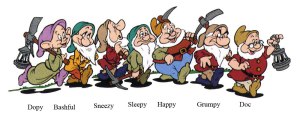- Get familiar iterating through arrays with enumerator methods like
#map,#find, and#include?. - Build methods and control their return values.
- Practice control flow with
ifandelsestatements.
Complete the following methods in cartoon_collections.rb.
This method should accept an array of dwarf names, for instance:
["Doc", "Dopey", "Bashful", "Grumpy"]It should then print out each name, in number order, using puts. The print-out
should look like this:
1. Doc
2. Dopey
3. Bashful
4. GrumpyLook into the #with_index method to access the index for each
element as you are iterating.
This method should accept an array argument of planeteer calls that will look like this:
planeteer_calls = ["earth", "wind", "fire", "water", "heart"]It should then capitalize each element and add an exclamation point at the end. The return value of this method should be an array, in this example:
summon_captain_planet(planeteer_calls)
# => ["Earth!", "Wind!", "Fire!", "Water!", "Heart!"]The #map method might be appropriate for this task, take a look at it
here.
Once the test for this method is passing, move on to the next method, long planeteer calls.
The #long_planeteer_calls method should accept an array of calls. The method
should return true if any of the calls are longer than four characters. For
example:
short_words = ["puff", "go", "two"]
long_planeteer_calls(short_words)
#=> false
assorted_words = ["two", "go", "industrious", "bop"]
long_planeteer_calls(assorted_words)
#=> trueNotice the return value of this method is either true or false, depending on
the array it was given as an argument.
Checkout the Ruby docs on arrays for a hint.
The #find_the_cheese method should accept an array of strings. It should then
look through these strings to find and return the first string that is a type of
cheese. The types of cheese that appear are "cheddar", "gouda", and
"camembert".
For example:
snacks = ["crackers", "gouda", "thyme"]
find_the_cheese(snacks)
# => "gouda"
soup = ["tomato soup", "cheddar", "oyster crackers", "gouda"]
find_the_cheese(soup)
# => "cheddar"If, sadly, a list of ingredients does not include cheese, return nil:
ingredients = ["garlic", "rosemary", "bread"]
find_the_cheese(ingredients)
# => nilYou can assume that all strings will be lowercase. Take a look at the
#include? method for a hint. This method asks you to return a string
value instead of printing it so keep that in mind.
- The
#with_indexmethod - The
#mapmethod - The
#include?method



